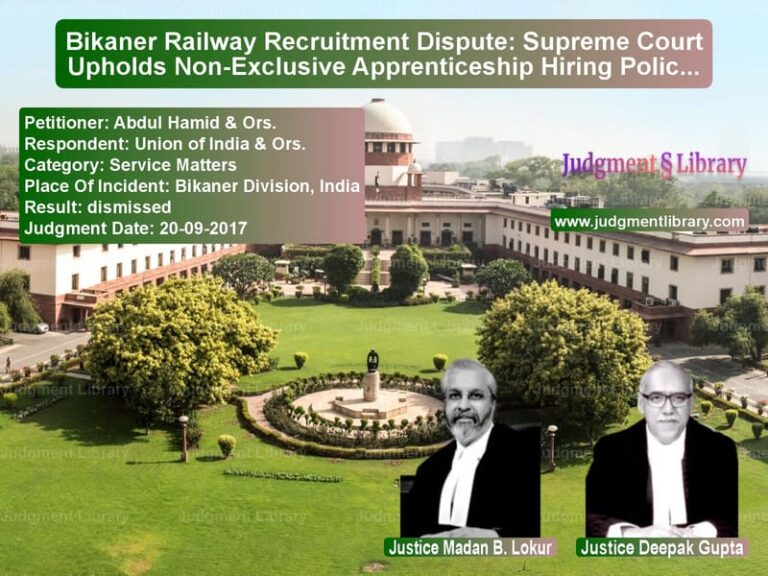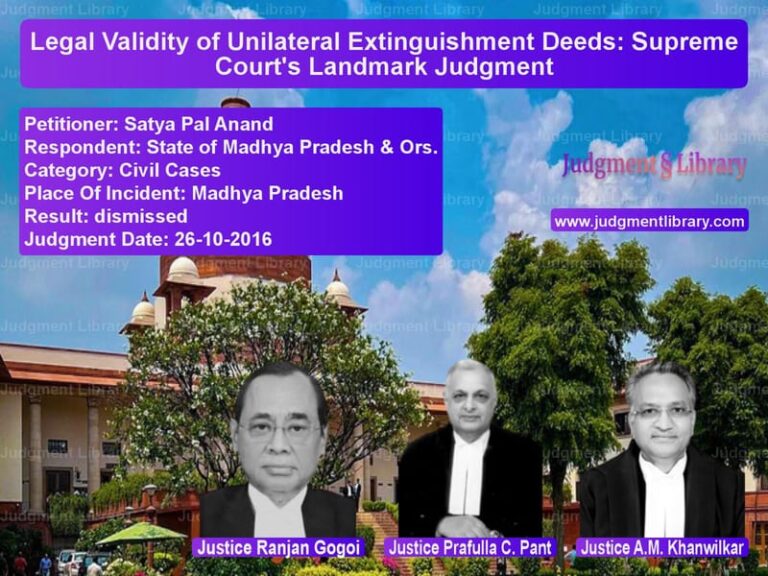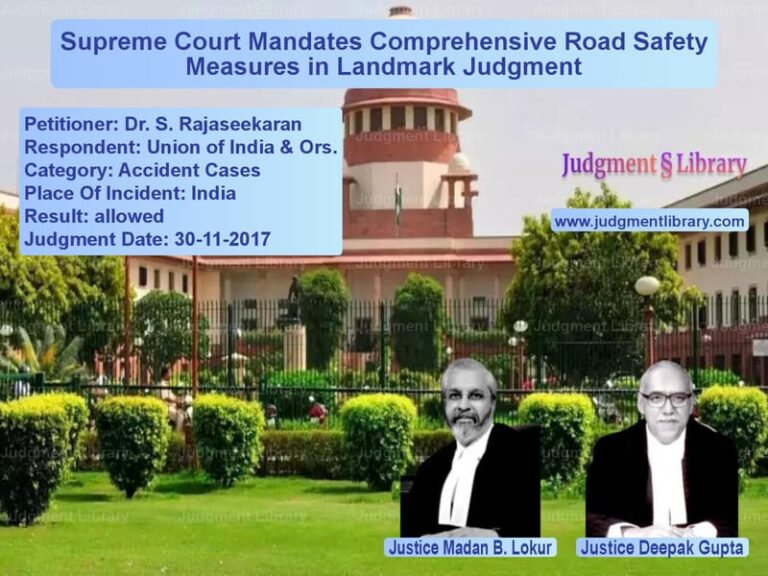Supreme Court Rules on Delayed Reporting of Seized Property Under CrPC Section 102(3)
The Supreme Court of India has delivered a significant ruling in Shento Varghese v. Julfikar Husen & Others, addressing the legal implications of delayed reporting of property seizure under Section 102(3) of the Code of Criminal Procedure (CrPC). The judgment clarifies whether a failure to promptly inform the jurisdictional magistrate invalidates the seizure order itself.
Background of the Case
The case arose from an investigation into Crime No. 318 of 2022, registered in Tamil Nadu. The police had seized the bank accounts of the accused in connection with a fraud case but delayed reporting the seizure to the jurisdictional magistrate. The Madras High Court quashed the seizure order on the sole ground that it was not reported ‘forthwith’ to the magistrate as mandated by Section 102(3) CrPC. Aggrieved by this decision, the complainant, Shento Varghese, appealed to the Supreme Court.
Key Legal Issues
- Does a delay in reporting a seizure to the magistrate under Section 102(3) CrPC automatically invalidate the seizure order?
- Is the requirement to report the seizure ‘forthwith’ mandatory or merely directory?
- What are the consequences of a police officer’s failure to comply with the reporting obligation?
Arguments by the Appellant (Shento Varghese)
- The delay in reporting the seizure does not affect the validity of the order itself.
- The obligation to report a seizure ‘forthwith’ should be interpreted reasonably, considering practical challenges.
- The Madras High Court erred in quashing the seizure solely on procedural grounds without considering its merits.
Arguments by the Respondents (Julfikar Husen & Others)
- Section 102(3) CrPC uses the word ‘shall,’ indicating that reporting to the magistrate is a mandatory requirement.
- Failure to comply with this obligation renders the entire seizure process unlawful.
- Allowing such delays would encourage arbitrary police actions without judicial oversight.
Supreme Court’s Observations
The Supreme Court, comprising Justices Aravind Kumar and Pamidighantam Sri Narasimha, examined conflicting High Court rulings on this issue. Some judgments had held that delayed reporting nullifies the seizure order, while others viewed it as a procedural irregularity that does not affect the validity of the seizure.
- The Court noted that Section 102(3) CrPC does not prescribe any express consequence for delayed reporting.
- “The power to seize property connected with a crime is plenary. The obligation to intimate the magistrate is an incidental exercise of that power—breach of the latter cannot affect the former.”
- The Court held that the obligation to report is mandatory but not jurisdictional. Failure to comply with this duty does not invalidate the seizure but may attract departmental action against the concerned officer.
- The judgment emphasized that the purpose of reporting is to facilitate judicial oversight over the disposal of property, not to nullify lawful seizures.
The Court referred to its past rulings:
- Bhajan Singh v. State of Haryana: Mere delay in procedural compliance does not vitiate criminal proceedings.
- Nevada Properties Pvt. Ltd. v. State of Maharashtra: Seizure orders must have a direct link to the offense.
- Ravinder Kumar v. State of Punjab: Delay in registration or reporting of an FIR does not automatically invalidate the case.
Final Judgment
- The Supreme Court set aside the Madras High Court’s ruling, holding that delayed reporting does not render a seizure order void.
- The matter was remanded to the trial court for proceedings on the merits of the case.
- The Court directed that police officers failing to comply with the reporting obligation may face disciplinary action but such failure does not affect the legality of the seizure.
Implications of the Judgment
- The ruling establishes that procedural lapses in reporting do not automatically vitiate criminal investigations.
- It reinforces the principle that law enforcement actions should be subject to judicial oversight without compromising substantive justice.
- The judgment clarifies the legal position for police officers, ensuring compliance with procedural mandates while preventing technical dismissals of genuine cases.
Conclusion
The Supreme Court’s decision in Shento Varghese v. Julfikar Husen & Others resolves a long-standing legal conflict regarding delayed reporting of seizures. By holding that non-compliance with Section 102(3) CrPC does not nullify a seizure, the Court has struck a balance between procedural compliance and substantive justice. This ruling will guide law enforcement agencies and lower courts in handling cases involving seized property.
Petitioner Name: Shento Varghese.Respondent Name: Julfikar Husen & Others.Judgment By: Justice Aravind Kumar, Justice Pamidighantam Sri Narasimha.Place Of Incident: Tamil Nadu.Judgment Date: 13-05-2024.
Don’t miss out on the full details! Download the complete judgment in PDF format below and gain valuable insights instantly!
Download Judgment: shento-varghese-vs-julfikar-husen-&-oth-supreme-court-of-india-judgment-dated-13-05-2024.pdf
Directly Download Judgment: Directly download this Judgment
See all petitions in Fraud and Forgery
See all petitions in Bail and Anticipatory Bail
See all petitions in Custodial Deaths and Police Misconduct
See all petitions in Other Cases
See all petitions in Judgment by Aravind Kumar
See all petitions in Judgment by P.S. Narasimha
See all petitions in allowed
See all petitions in Remanded
See all petitions in supreme court of India judgments May 2024
See all petitions in 2024 judgments
See all posts in Criminal Cases Category
See all allowed petitions in Criminal Cases Category
See all Dismissed petitions in Criminal Cases Category
See all partially allowed petitions in Criminal Cases Category







